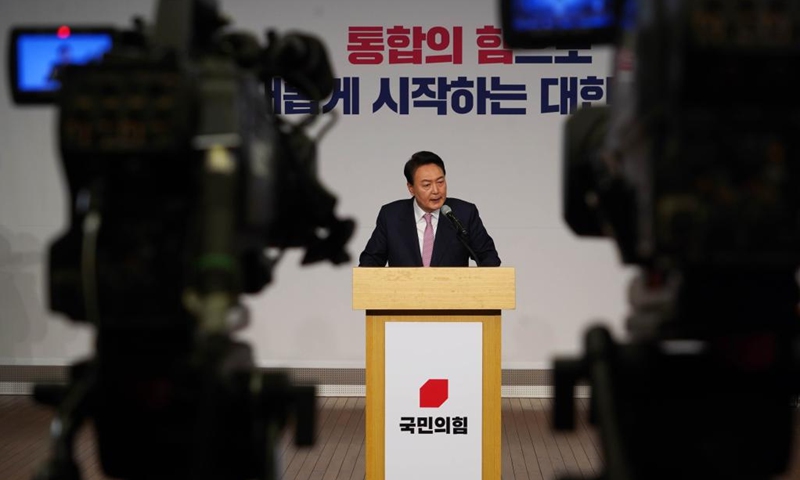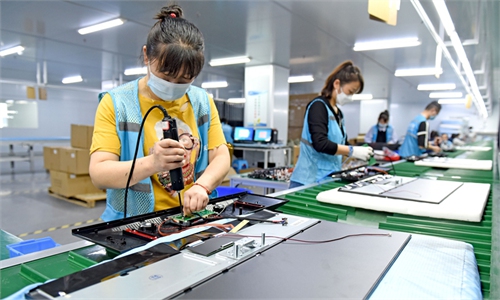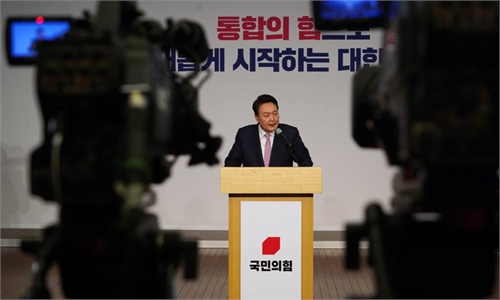
President-elect Yoon Suk-yeol speaks during a press conference at the National Assembly Library in Seoul, South Korea, March 10, 2022. Photo: Xinhua
The inauguration of 20th South Korean President Yoon Suk-yeol is scheduled on Tuesday. At the invitation of the South Korean government, Chinese President Xi Jinping's special representative, Vice President Wang Qishan, will lead a delegation to South Korea to attend the inauguration ceremony. Also more than 300 foreign dignitaries will be present, including Douglas Emhoff, the spouse of US Vice President Kamala Harris, and Japanese Foreign Minister Yoshimasa Hayashi.
Against the backdrop of the profound adjustment of the international structure, the transition of power in South Korea has attracted much attention. South Korea's role in Northeast Asia, when the country enters "the era of Yoon," has already emerged, but remains largely uncertain. Since Yoon was elected, the US has stepped up its attempts to rope in South Korea. And NATO, under the control of the US, is also extending its tentacles to the Korean Peninsula. The environment of mutual benefit and win-win in Northeast Asia is encountering erosion. Washington wants to turn South Korea into a pawn in its "Indo-Pacific Strategy," and this will become the biggest variable affecting South Korea's relations with China.
As a matter of fact, Washington is presenting the new South Korean government with a single choice. The purpose of wooing and pressuring is to urge South Korea to join their "anti-China camp" and make China-South Korea relations an "accessory" to South Korea-US relations, which will inevitably undermine the vital interests of South Korea and impair South Korea's economic development momentum. As most of the previous South Korean governments had a clear understanding of this, they had always shunned "taking sides," and strived to achieve a complicated and delicate balance.
Today, the pressure from the US has ramped up significantly, and Japan has shown its willingness to lead the way for NATO, which greatly compresses South Korea's strategic space. However, as long as South Korea continues to adhere to its independent path and proceed from the fundamental interests of its own people, a solution will be found. Yoon recently said in an interview with US media that continued tensions between the US and China could be both an opportunity and a risk for South Korea. He said he believes there are ways for Seoul to achieve peace, co-prosperity and coexistence with the two major powers. If South Korea can play a constructive role in this regard, then its international status and image will be a long way ahead of Japan, another Northeast Asian country.
When reporting Wang's attendance of Yoon's inauguration, many South Korean media mentioned that such a high-level arrangement reflects the importance China attaches to South Korea and China's expectation of the bilateral relations. Unlike some hegemonic countries that force others to take sides, China has always insisted on friendship with all countries on an equal footing, and the respect and importance it attaches to South Korea will not change with the election of a new president. China has displayed huge sincerity to push its ties with South Korea to move forward steadily and develop the ties to a higher level. But China will not make any changes or concessions on sensitive issues involving major interests and concerns.
We have noticed that additional deployment of THAAD was not included in the Yoon administration's key policy tasks outlined by the transition team. The general vision behind those tasks is "a Republic of Korea that leaps anew, a people's nation of co-prosperity."
It claims South Korea needs to maintain and develop cooperative relations with China, and the new government needs to promote diplomacy with China on the basis of mutual respect and cooperation. Despite the changing global geopolitical situation and the potential political pressure the new Yoon administration might have to face at home and abroad, the experience accumulated in the 30 years of China-South Korea diplomatic relations indicates that the bilateral ties should be one of the major aspects that Yoon is most likely to handle smoothly and leave a positive political legacy.
It is worth mentioning that US President Joe Biden will visit South Korea soon, and it has been disclosed that Biden may "invite" South Korea to join the US "camp of blocking China." Sensitive South Korean media have already noted that this is the quickest meeting between a US president and a South Korean president after the latter takes office. This time, Biden will visit South Korea before his trip to Japan. In this regard, those media didn't feel "being flattered," but they are wary that Washington may press Seoul to make choices contrary to South Korea's national interests. It should be said that such a pragmatic and calm attitude is necessary for a nation that has self-respect and strives for self-improvement.



